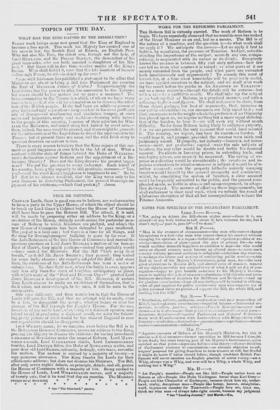NECK OR NOTHING.
CERTAIN Lords, there is good reason to believe, are endeavouring to form a party in the Upper House, of which the object should be 10 break up Lord GREY'S Cabinet before the House of Commons shall have time to pass the Reform Bill. The attack, it is said, will be made by proposing either an address to the King, or a resolution of the House, strongly condemning the particular mea- sure of Reform to which Ministers are pledged, and which the new House of Commons has been delegated to pass unaltered. The project is a bold one ; but there is a time for all things, and the time for Borougionongers' bullying is gone by for ever. If the Anti-Reformers of the late House of Commons had moved the previous question on Lord JOHN Russaeos motion of the famous First of March, they might perhaps—indeed they probably would —have ousted the Ministers. But the Bill "took away their breath," as it did Mr. JOIIN Sntrrti's ; they paused ; they waited for sonic lucky chance : the country adopted the Bill ; and since then, time existence of the Anti-Reformers has been a series of taibmisons. To show fight now, when the battle is over, appears only less silly than the roars of leughter, anticipatory of place, with which some of the " Peel and Dawson Crewe" greeted Lord done; Rossieth.'s development of the Bill. However, if certain Tory Lords choose to make an exhibition of themselves, that is their affair, not ours—though, to be sure, it will be nuts to the newspapers.
Our own deliberate and firm convielion is, that the House of Lords will pass the 1;i:1, and that no attempt will be made, even by a few, lo disappoint the people, whether before or finer the passage of time Bill through the People's House. For the use, however, of any noble Lord, %vim, being of a different opinion, may intend to aid in pi:a:acing a different result, we offer the follow- ing petty picture of what would he the state of England in case our eeaceetideill should be disappointed.
Lord WHAIINf:LIFFE, let us imagine, even before the Bill is in the Delegation House or Commons, moves an address to the King, praying ids Majesty to dismiss his Ministers for having introduced a measure of Revolution under the name of Reform. Lord M aars- FIELD seconds, Lord CARNARVON thirds, Lord LONDONDERRY fourths, Lord EXETER fifths, the Duke of NEWCASTLE sixths, and poor dear old Lord ELDON, solemnly, feelingly, with tears, sevenths the motion. The motion is carried by a majority of twenty—a very generous allowance. The King thanks time Lords for their affectionate address; but clues not dismiss his Ministers. The Bill, after only seven nights' debate, on principle, details, and all, passes the House of Commons with a majority of 156. Being carried to the House of Lords, Lord Wn■RNCLIEFE moves, and a majority :of twenty vote, that it be read that day six months. The Ministers
resign next morning *. * * * • * * * * * * * * • *
* See "The Standard," passim.


























 Previous page
Previous page